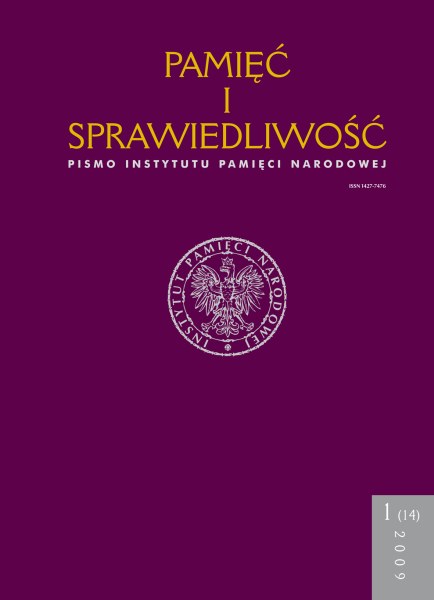Niemiecka polityka ekonomiczna na okupowanych terenach wschodniej Polski w latach 1941–1944
Pamięć i Sprawiedliwość, Tom 14 Nr 1 (2009), strony: 93-102
Data publikacji: 2009-12-30
Abstrakt
The German economic policy in the occupied Eastern Poland has not been well analysed yet. In Eastern Poland, the occupiers encountered different economic structures than in the western part of the country. The size of population and the number of enterprises were much smaller, big industry was largely non-existent and the Soviet occupation authorities had nationalised most of the economy. The German occupiers were not interested in the development of the infrastructure and, to a large extent, limited themselves to the exploitation of raw materials, especially oil and natural gas in Eastern Galicia, as well as to the recruitment of labour force for the Reich. Additionally, the textile industry gained a certain importance
for the German war economy. The re-privatisation was limited; a considerable part of the enterprises was shut down and never reopened. The Jewish minority, which had played a considerable role in the economic life, was expropriated and almost entirely murdered. The occupiers also displayed little interest in the re-privatisation of agriculture which – especially in Eastern Galicia – gained increasingly greater importance. In 1943, the Galicia District became the chief provider of grain in the occupied Poland. From the middle of 1942, the Soviet guerrilla war increasingly affected the economic exploitation in North-eastern Poland and from 1943 the activity of the Ukrainian Insurgent Army (UPA) had
the same effect in South-eastern Poland. Finally, the retreat of the Wehrmacht was accompanied with extensive destruction of the infrastructure and economy.
Inne teksty tego samego autora
- Jacek Wołoszyn, Dieter Pohl, Bogdan Musiał, [Recenzja] Dieter Pohl, Von der „Judenpolitik” zum Judenmord. Der Distrikt Lublin des Generalgouvernements 1939–1944, Verlag Peter Lang GmbH, Frankfurt am Main–Berlin–Bern–New York-Paris–Wien 1993, ss. 208 i Bogdan Musial, Deutsche Zivilverwaltung und Judenverfolgung im Generalgouvernement. Eine Fallstudie zum Distrikt Lublin 1939–1944, Verlag Harrassowitz, Wiesbaden 1999, ss. 435 , Pamięć i Sprawiedliwość: Tom 6 Nr 2 (2004)
 Język Polski
Język Polski
 English
English
 Deutsch
Deutsch
 Français (France)
Français (France)
 Italiano
Italiano
 Русский
Русский


 PDF
PDF
